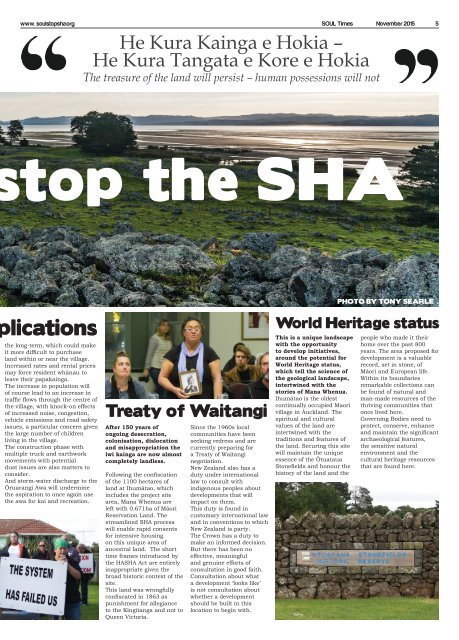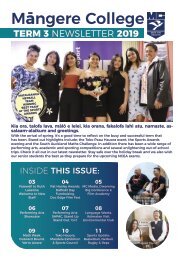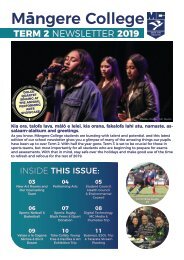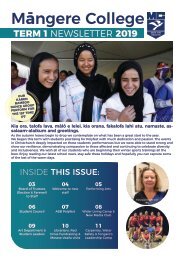SOUL TIMES ONLINE
Create successful ePaper yourself
Turn your PDF publications into a flip-book with our unique Google optimized e-Paper software.
www. soulstopsha.org <strong>SOUL</strong> Times November 2015 5<br />
He Kura Kainga e Hokia –<br />
He Kura Tangata e Kore e Hokia<br />
The treasure of the land will persist – human possessions will not<br />
top the SHA<br />
PHOTO BY TONY SEARLE<br />
lications<br />
the long-term, which could make<br />
it more difficult to purchase<br />
land within or near the village.<br />
Increased rates and rental prices<br />
may force resident whānau to<br />
leave their papakainga.<br />
The increase in population will<br />
of course lead to an increase in<br />
traffic flows through the centre of<br />
the village, with knock-on effects<br />
of increased noise, congestion,<br />
vehicle emissions and road safety<br />
issues, a particular concern given<br />
the large number of children<br />
living in the village.<br />
The construction phase with<br />
multiple truck and earthwork<br />
movements with potential<br />
dust issues are also matters to<br />
consider.<br />
And storm-water discharge to the<br />
Ōruarangi Awa will undermine<br />
the aspiration to once again use<br />
the awa for kai and recreation.<br />
Treaty of Waitangi<br />
After 150 years of<br />
ongoing desecration,<br />
colonisation, dislocation<br />
and misappropriation the<br />
iwi kainga are now almost<br />
completely landless.<br />
Following the confiscation<br />
of the 1100 hectares of<br />
land at Ihumātao, which<br />
includes the project site<br />
area, Mana Whenua are<br />
left with 0.671ha of Māori<br />
Reservation Land. The<br />
streamlined SHA process<br />
will enable rapid consents<br />
for intensive housing<br />
on this unique area of<br />
ancestral land. The short<br />
time frames introduced by<br />
the HASHA Act are entirely<br />
inappropriate given the<br />
broad historic context of the<br />
site.<br />
This land was wrongfully<br />
confiscated in 1863 as<br />
punishment for allegiance<br />
to the Kingitanga and not to<br />
Queen Victoria.<br />
Since the 1960s local<br />
communities have been<br />
seeking redress and are<br />
currently preparing for<br />
a Treaty of Waitangi<br />
negotiation.<br />
New Zealand also has a<br />
duty under international<br />
law to consult with<br />
indigenous peoples about<br />
developments that will<br />
impact on them.<br />
This duty is found in<br />
customary international law<br />
and in conventions to which<br />
New Zealand is party.<br />
The Crown has a duty to<br />
make an informed decision.<br />
But there has been no<br />
effective, meaningful<br />
and genuine efforts of<br />
consultation in good faith.<br />
Consultation about what<br />
a development ‘looks like’<br />
is not consultation about<br />
whether a development<br />
should be built in this<br />
location to begin with.<br />
World Heritage status<br />
This is a unique landscape<br />
with the opportunity<br />
to develop initiatives,<br />
around the potential for<br />
World Heritage status,<br />
which tell the science of<br />
the geological landscape,<br />
intertwined with the<br />
stories of Mana Whenua.<br />
Ihumātao is the oldest<br />
continually occupied Maori<br />
village in Auckland. The<br />
spiritual and cultural<br />
values of the land are<br />
intertwined with the<br />
traditions and features of<br />
the land. Securing this site<br />
will maintain the unique<br />
essence of the Ōtuataua<br />
Stonefields and honour the<br />
history of the land and the<br />
people who made it their<br />
home over the past 800<br />
years. The area proposed for<br />
development is a valuable<br />
record, set in stone, of<br />
Māori and European life.<br />
Within its boundaries<br />
remarkable collections can<br />
be found of natural and<br />
man-made resources of the<br />
thriving communities that<br />
once lived here.<br />
Governing Bodies need to<br />
protect, conserve, enhance<br />
and maintain the significant<br />
archaeological features,<br />
the sensitive natural<br />
environment and the<br />
cultural heritage resources<br />
that are found here.

















